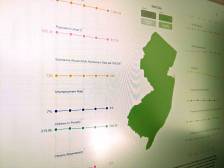‘Data fellows’ yield model gains in N.J. social services agency
New Jersey officials are seeing the benefits of creating data champions within a state social services agency that is being held up as a model for other states.
Like most states, New Jersey struggled to balance the competing demands of its child welfare system, with its growing caseloads and budget constraints that during the darker days of the recession meant fewer employees to handle the work.
That led officials for the New Jersey Department of Children and Families, or NJDCF, to try a different approach. They launched a new initiative beginning in 2009 to change the agency’s culture and technical capacity to make better use of data.
 Under the initiative, NJDCF developed an 18-month program that trained 100 “data fellows” from different levels within the agency who succeeded in helping workers better understand the dynamics shaping their workloads using data and find better-informed ways to manage them. The program was funded by the Northeast and Caribbean Child Welfare Implementation Center.
Under the initiative, NJDCF developed an 18-month program that trained 100 “data fellows” from different levels within the agency who succeeded in helping workers better understand the dynamics shaping their workloads using data and find better-informed ways to manage them. The program was funded by the Northeast and Caribbean Child Welfare Implementation Center.
The Manage by Data initiative has led to a number of changes in the way NJDCF conducts its operations that are proving instructive to other agencies, according to a new report for the IBM Center for The Business of Government, written by David Lambert and Julie Atkins at the University of Southern Maine.
For example, the data fellows found that offices that held more frequent supervisor conference investigations with staff tended to save time and produced better results, in some cases doubling the timeliness of investigations in some offices.
Fellows also discerned from the data that rates of anonymous calls varied widely for screeners (ranging from 3 percent to 50 percent).
“By observing the best screeners, they were able to develop a script for use by all screeners that resulted in far fewer anonymous referrals – dropping by more than 2,000 in an 18-month period,” noted John Kamensky, senior fellow at the IBM Center for The Business of Government, in a blog about the report.
More strategically, he said, the Manage by Data effort “gave Data Fellows the opportunity to exercise leadership and to serve as ‘data ambassadors’ with their colleagues, regardless of their role within the department,” he said.
“It also contributed to the use of monthly ChildStat meetings at the departmental level as learning sessions to create culture around data — not a punishment or accountability session,” which had been a prior experience.
How data is used and presented is crucial, said Kamensky, who noted while the evolution of technology and performance management has given rise to lots of operating data, analyzing and presenting data in useful forms has been a missing step.
“But the New Jersey Managing by Data program demonstrates the importance of engaging managers and frontline staff in using the data they collect. The New Jersey program successfully developed staff capacity, helped develop a candidate pool for leadership promotions, and established a model for data-driven management. And that’s good management,” he said.





